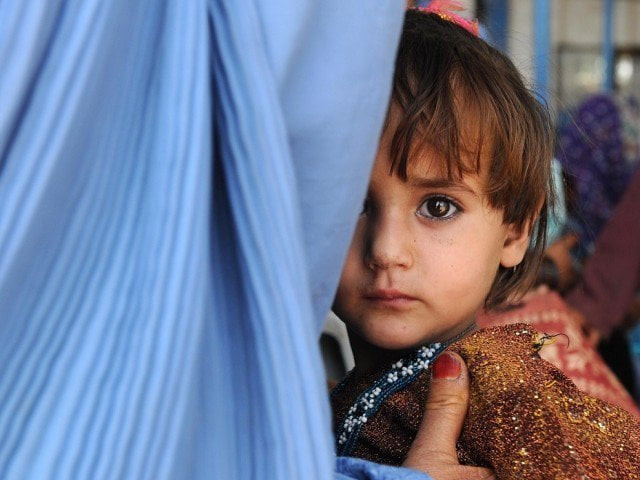Mission Impossible: UNHCR says no to forced repatriation of refugees
Refugee agency casts doubts over ability to send back 1.5million people to Afghanistan

A file photo of an Afghan refugee girl in Peshawar. PHOTO: AFP
United Nations High Commission for Refugees (UNHCR) officials said on Monday they would not agree to the forced return of Afghan refugees living in Pakistan.
UNHCR Peshawar sub office head Jacques Franquin said his organisation would stand firm on the issue. Briefing the media at a local hotel in the provincial capital, he cast doubts over the ability to meet the repatriation deadline of December 31, 2015.

“It would be difficult to send around 1.5 million people back to their native land.” Franquin said UNHCR was negotiating with Pakistani authorities to ensure that refugees return safety and with their dignity intact.
To a question about extending the deadline, he said his organisation has been pleading with Pakistan officials for years to show flexibility and compassion.
Host of problems
He said there were three solutions to the problem of refugees: Repatriation, integration in host countries and finally resettlement to a third country. Franquin said Pakistani authorities were not ready to consider integration process and want Afghans to return to their country. The UNHCR head believed that the matter of unregistered Afghans in Pakistan could be resolved through visas.
He admitted there was also donor fatigue for Afghan refugees, saying funding was shrinking year by year.
Post APS attack
According to the UN refugee agency, at least 10,777 Afghan refugees have returned to their country during the first three months of the current year, adding the attack on the Army Public School (APS) has expedited the repatriation process.
UNHCR Protection Officer Bashir Ahmed, also present at the briefing, said since the APS massacre, about 700 registered Afghans were rounded up by police. However, all of them were later released without being charged, he added.

Ahmed said Pakistan lacked legislation related to refugees despite hosting millions of them over the course of 35 years. He added the whole affair was being run through ad hoc arrangements.
He said UNHCR and the Pakistan government completed the registration process of Afghan refugees back in 2006 under which they were issued machine-readable proof of registration cards. “Registered refugees are of concern to us and they are about 1.6 million in number,” he said.
Ahmed added the Solution Strategy for Afghan Refugees was launched in 2012 and aims to make voluntary repatriation sustainable by providing economic opportunities and ensuring development of refugee-hosting areas. However, he said there were political and economic considerations that compelled people to continue living in Pakistan.
UN refugee agency figures shared with the media showed that about 6,394 people returned to Afghanistan all of last year, but the number was already up to 10,777 by March 31, 2015.
The document also showed reasons for the return of these refugees. Around 41% returned due to the fear of arrest or deportation, while 30% went back due to camp/settlement closures or relocation campaigns.
UNHCR figures show there are about 965,301 Afghan refugees in K-P and Fata. Of the total, 53% live in Peshawar, while Nowshera is home to 9%.
Published in The Express Tribune, April 15th, 2015.













COMMENTS
Comments are moderated and generally will be posted if they are on-topic and not abusive.
For more information, please see our Comments FAQ